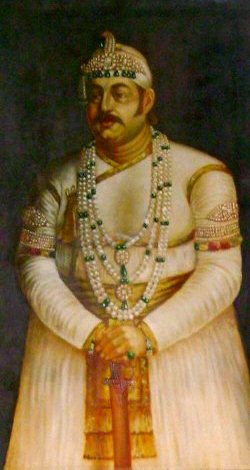Afzal-ud-Daulah facts for kids
Quick facts for kids Afzal ad-DawlahGCSI |
|||||
|---|---|---|---|---|---|
| Āṣaf Jāh V Niẓāmu ʾl Mulk Afḍalu ʾl Daūlah |
|||||
 |
|||||
| 8th Nizam of Hyderabad State | |||||
| Reign | 16 May 1857 – 26 February 1869 | ||||
| Predecessor | Nasir-ud-dawlah, Asaf Jah IV | ||||
| Successor | Mir Mahboob Ali Khan, Asaf Jah VI | ||||
| Born | 11 October 1827 Gufran Manzil, Hyderabad State, British India |
||||
| Died | 26 February 1869 (aged 41) Hyderabad, Hyderabad State, British India |
||||
| Burial | Mecca Masjid, Hyderabad | ||||
| Spouse |
|
||||
| Issue | Mir Mahboob Ali Khan Siddiqi, Asaf Jah VI Hussain-un-Nisa Begum Jahandar-un-Nisa Begum Parvarish-un-Nisa Begum Siraj-un-Nisa Begum |
||||
|
|||||
| House | Asaf Jahi | ||||
| Father | Nasir-ud-dawlah, Asaf Jah IV | ||||
| Mother | Dilawar-un-Nisa Begum | ||||
| Religion | Sunni Islam | ||||
Afzal ad-Dawlah, Asaf Jah V (born 11 October 1827, died 26 February 1869) was the eighth ruler, or Nizam, of Hyderabad in India. He ruled from 1857 to 1869. His full name was Mir Tahniyat Ali Khan Siddiqi.
Contents
His Kingdom
Afzal ad-Dawlah's kingdom was quite large. It was divided into five big areas called 'subahs' and sixteen smaller districts. Each subah had a leader called a Subedar, and each district had a 'Taluqdar'.
Important Changes and Reforms
During Afzal ad-Dawlah's rule, many important changes were made to help the people of Hyderabad. His Prime Minister, Salar Jung, helped a lot with these reforms.
Education and Health
- Hyderabad Medical School: In 1846, he started the Hyderabad Medical School. This school later became known as Osmania Medical College. It helped train doctors and improve healthcare.
- Dar-ul-Uloom: In 1854, the first proper educational institution in Hyderabad, Dar-ul-Uloom, was set up. This was a big step for learning in the region.
Help for Pilgrims
- Nizam's Rubath: The Nizam bought a special building called the Nizam's Rubath in the holy city of Mecca. This building was a place for people from Hyderabad to stay when they went on their religious journey (Hajj). It used to have 42 buildings, but now only three remain due to the expansion of the Grand Mosque.
Other Improvements
Many other changes happened during his time:
- Central Treasury: In 1855, a central government treasury was created. This helped manage the kingdom's money better.
- Justice System: The way justice was given out was improved.
- Postal Service: A new postal service was started, making it easier to send letters.
- Modern Networks: The first rail and telegraph lines were built in Hyderabad. This brought modern communication and transport to the kingdom.
In 1861, Afzal ad-Dawlah was given a special award called the Star of India.
Family Life
Afzal ad-Dawlah was the oldest son of Nasir-ud-dawlah, Asaf Jah IV and his wife Dilawar-un-Nisa Begum.
He was married three times:
- Mahbub Begum
- Hussaini Begum
- Allah Rakhi Begum
He had several children:
- Sons:
- Mahboob Ali Khan (who later became the next Nizam)
- Daughters:
- Hussain-un-Nisa Begum
- Parvarish-un-Nnisa Begum
- Siraj-un-Nisa Begum
- Jahandar-un-Nisa Begum
His Death
Afzal ad-Dawlah passed away in Hyderabad on 26 February 1869. He had ruled for 12 years. He was buried at the Mecca Masjid mosque in Hyderabad.
See Also
- Nasir-ud-dawlah, Asaf Jah IV
- Mahboob Ali Khan, Asaf Jah VI
- Kingdom of Hyderabad
 | Victor J. Glover |
 | Yvonne Cagle |
 | Jeanette Epps |
 | Bernard A. Harris Jr. |

